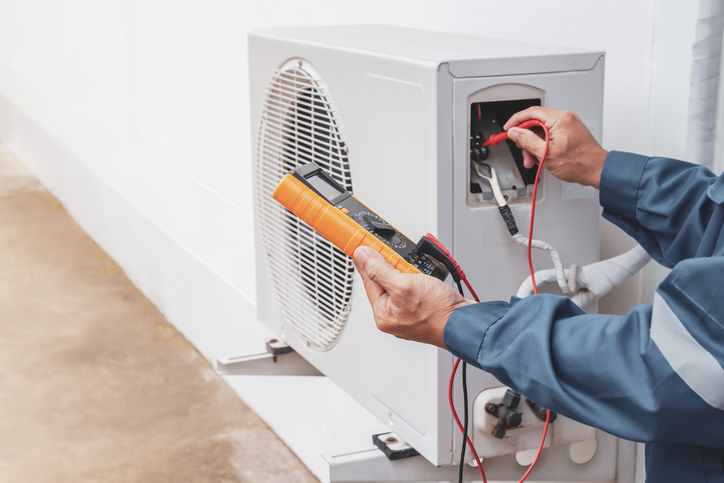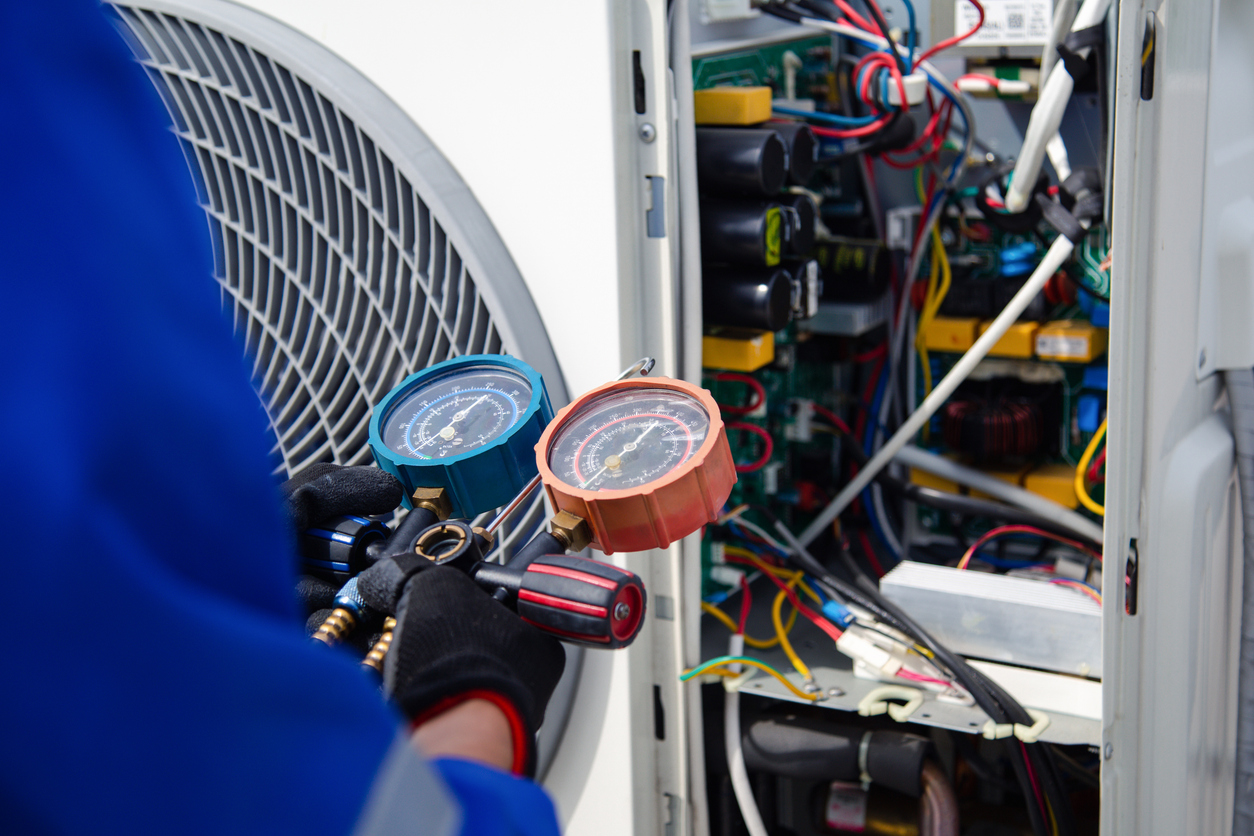The complete checklist to ac unit replacement for homeowners
Comprehending Cooling And Heating: Typical Problems of Air Conditioner Systems and Their Solutions
HVAC systems play an important duty in preserving interior comfort. Nevertheless, cooling systems usually encounter typical issues that can prevent their performance. Issues like inadequate air conditioning, uncommon noises, and constant biking can show deeper mechanical concerns. Additionally, water leakages and undesirable odors can compromise air high quality. Understanding these difficulties and their solutions is crucial for reliable maintenance. What steps can house owners take to ensure their AC devices run successfully?
Inadequate Air Conditioning Performance
What causes inadequate cooling performance in a cooling and heating system? A number of aspects can add to this issue. A typical cause is a dirty air filter, which restricts air movement and reduces cooling down efficiency. Furthermore, reduced cooling agent levels because of leaks can prevent the system's capability to take in warmth effectively. An additional prospective problem might emerge from a malfunctioning thermostat, bring about wrong temperature level readings and incorrect air conditioning cycles. Blocked or filthy condenser coils can also avoid warmth dissipation, further impacting efficiency. Lastly, ductwork concerns, such as leaks or obstructions, can lead to unequal cooling throughout a space. Determining these problems quickly is important for keeping suitable a/c feature and guaranteeing a comfy indoor setting. Normal upkeep and assessments can aid minimize these concerns and enhance the system's total performance.
Unusual Sounds Coming From the Air Conditioner Device
A variety of uncommon noises originating from an air conditioning system can indicate underlying concerns that call for attention. Typical audios consist of rattling, which might suggest loose elements or particles within the unit. Hissing noises frequently aim to refrigerant leakages, compromising the system's effectiveness. A grinding noise could suggest worn-out bearings or electric motor problems, while a shrill screech could signify an issue with the compressor or a slipping belt.
Each of these sounds functions as a warning indication that something may be wrong, potentially resulting in more substantial damages if not attended to without delay. Homeowners need to avoid disregarding these auditory hints and think about speaking with a qualified heating and cooling specialist for diagnosis and repair. Prompt intervention can not just bring back capability yet additionally prolong the lifespan of the device. HVAC contractor. Recognizing these noises as indicators of trouble is crucial for preserving peak air conditioning performance
Frequent Biking On and Off
Regular cycling on and off can show inefficiencies or breakdowns within a cooling and heating system, usually described as short-cycling. This problem can result in increased power usage and may cause unnecessary endure the unit's elements. A number of factors can add to this issue, including a poorly sized air conditioning unit, a malfunctioning thermostat, or unclean air filters. When an air conditioning system is as well large for the area, it cools down also rapidly, causing it to cycle regularly without properly dehumidifying the air. If Read Full Report the thermostat is defective, it might incorrectly signify the unit to transform on and off. Furthermore, obstructed or dirty air filters can limit airflow, motivating the system to function more difficult and cycle regularly. Resolving these issues quickly is important to enhance performance, prolong the lifespan of the a/c system, and preserve excellent indoor comfort.
Water Leakages and Drain Issues
Water leaks and drainage concerns can present considerable obstacles for HVAC systems, resulting in prospective damage and ineffectiveness. These issues typically stem from blocked condensate drains, which prevent water from draining pipes appropriately and can result in overflow. In addition, damaged drain frying pans or inappropriate installation might exacerbate these leaks, creating water to build up in unwanted areas.
Normal upkeep is vital to avoid such problems; making sure that condensate lines are clear and drainpipe pans are intact can alleviate the risk of leakages. House owners need to consistently look for signs of moisture around the unit, as early discovery can protect against a lot more substantial damage. In instances where leakages are identified, instant action is needed, which might consist of getting rid of obstructions or replacing faulty elements. Attending to water leakages and drain issues not just secures the heating and cooling system but also keeps indoor air high quality and convenience.
Bad Smells and Air High Quality Issues
Bad smells rising from HVAC systems can show serious air high quality problems. More about the author Typical resources of these undesirable smells include mold, mildew, or germs growth in the ductwork, often due to moisture accumulation. If the system has an undesirable, musty smell, it might signal that the air filters are clogged or that there wants air flow, permitting pollutants to distribute. In addition, a burning odor might recommend electric problems or overheating components, needing immediate attention.
Property owners ought to frequently change air filters and schedule regular maintenance to ensure peak air quality. Using an air purifier can additionally aid get rid of odors and improve indoor air quality. If odors persist regardless of these steps, professional examination and cleansing might be essential to identify and fix underlying concerns. HVAC company. Understanding of these smells is crucial, as they can influence health and comfort in indoor settings

Regularly Asked Questions
How Frequently Should I Arrange Air Conditioner Upkeep?
It is recommended to set up AC maintenance at the very least yearly, ideally before the air conditioning period starts. Regular assessments can aid identify problems early, making certain effective procedure and extending the life-span of the unit.

What Is the Typical Lifespan of an Air Conditioning Device?
The ordinary lifespan of an AC system normally varies from 15 to twenty years. Elements such as upkeep, usage patterns, and environmental problems can substantially influence this period, influencing general efficiency and performance gradually.
Just how Do I Choose the Right Size Air Conditioner System for My Home?

What Are the Indications My Air Conditioner Unit Needs Substitute?

Can I Mount an AC Device Myself?
While mounting an air conditioner unit oneself is possible, it calls for technological understanding and correct tools. HVAC company. Lots of individuals may face challenges with setup, potentially leading to ineffectiveness or safety risks, making expert assistance advisable for excellent results
Verdict
In summary, comprehending usual a/c problems and their solutions is essential for keeping effective air conditioning system efficiency. Dealing with issues such as insufficient cooling, unusual noises, regular biking, water leakages, and undesirable smells can greatly improve indoor comfort and air quality. Normal upkeep, including filter modifications and prompt fixings, plays a considerable duty in preventing these issues. By remaining aggressive, homeowners can ensure their heating and cooling systems operate successfully, ultimately lengthening the life expectancy of their air conditioning systems.